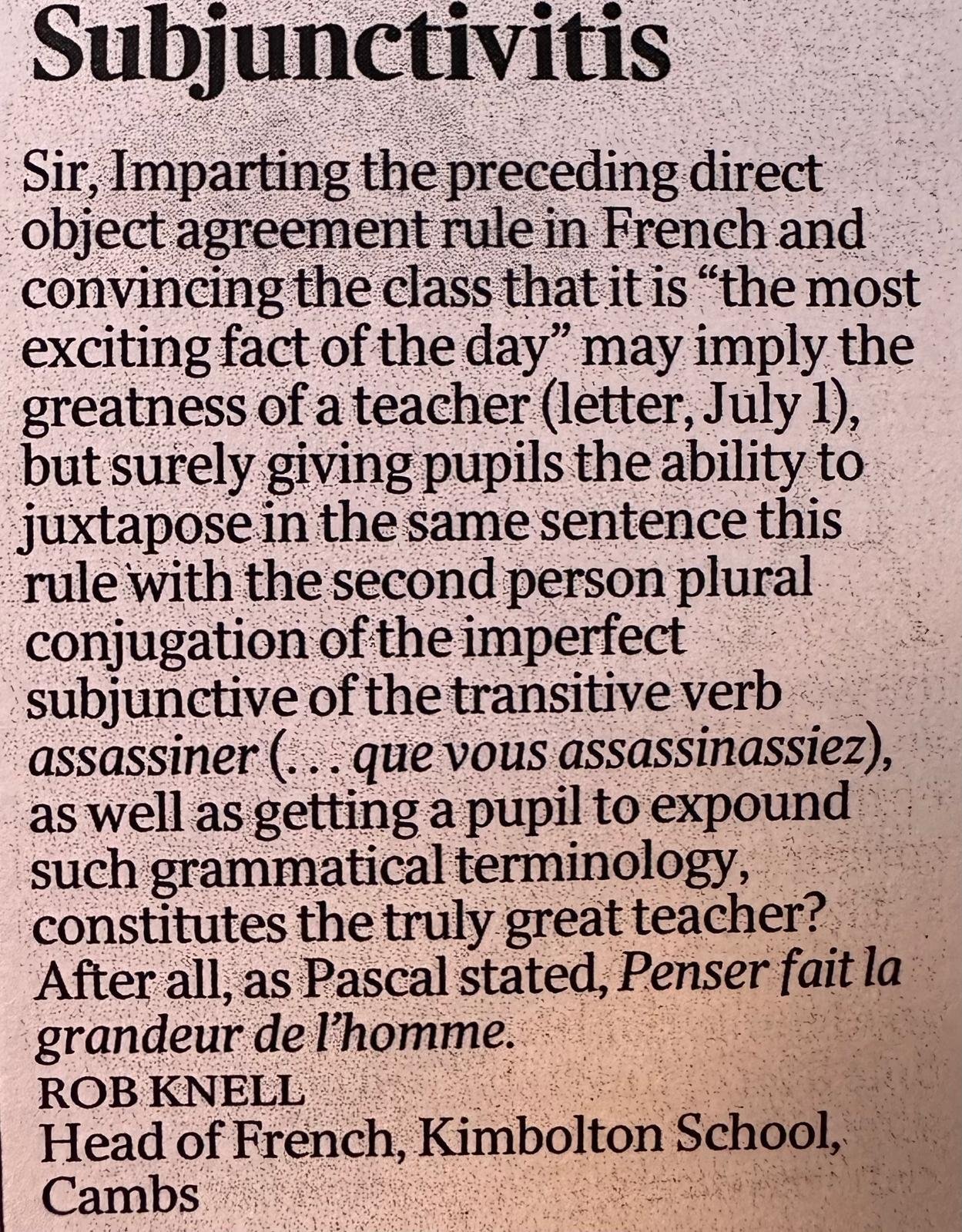The Inspiring Teacher
What makes a teacher inspirational and how might a teacher inspire?
We all recall a favourite teacher (I doubt I feature on the list of previous pupils, but I hope I have managed to inspire or motivate an individual, whether this be a pearl of ‘wisdom’ shared intentionally or otherwise, a love for French grammar, or simply some reassuring words), but what made that teacher a favourite? Was or is it the sartorial presentation, the boundless charisma, or the apparent font of knowledge?
I turn to the word ‘inspire’ and its etymology. It comes from:
Middle English inspiren, enspiren
Old French inspirer, a variant of espirer
Latin īnspīrāre, present active infinitive of īnspīrō (“breathe”)
loan-translation of Biblical Ancient Greek πνέω (pnéō, “breathe”)
Proto-Indo-European (s)peys- (“to blow, breathe”)
So how do we (teachers/tutors/academics) breathe life into our teaching and our place of learning? I would state at this point that there is no magic formula or fix. Much depends on the subject, the topic, the aspirations of both teacher and learner, the environment, the symbiotic relationship of educator (educare in Latin = to lead or nourish) and student, or possibly the state of mind of the teacher on a given day (the last lesson of a Friday takes some resolve after a busy week or a sleepless night before a day’s teaching can bring its challenges!).
NB I interchange the words pupil, student, learner, teacher, educator to eschew semantic ennui!
The following set of 8 ideas is certainly not a checklist, nor is it intended to be an ersatz to charisma, flair, and a passion for imparting knowledge. What matters most is to do ones best and exercise wisdom and compassion; knowledge proves, but wisdom improves!
Do I greet the teaching group at the door (the technology can wait and whatever unknown glitch will not obfuscate the lesson)? Furthermore, am I at the classroom door at the end of the lesson to wish pupils a nice rest-of-the-day and an individual “goodbye” (this takes very little time and cements relationships)?
Do I thank the class and praise the students for their contributions, efforts, and respect? This reaps dividends in myriad ways (relational, class chemistry, building a sense of worth, unlocking latent potential)
Humour can be a useful tactic to ‘break the ice’, start a lesson, or de-escalate a potentially tricky situation. I would avoid frivolous or nugatory forms; however, a related pun or an amusing anecdote may well be the trigger for a successful lesson. Each can simply demonstrate that the pupil is not entering an educational lair or place of discomfort
Do I move about the classroom, ensuring that the lesson dynamic is not about me seated behind a desk with little interest of outcomes, save the end of the class? This allows for a meaningful chat and engenders trust.
Am I available? I may not be free at the very moment required (due to a prior engagement in the diary or a problem that arises), but I must cultivate a ‘I-am-here-for-you’ environment should the pupil not understand a point (my poor teaching?), need extra assistance, be feeling anxious about a test, or require reassurance
Do I choose the classroom or teaching language carefully; judicious words in terms of clarity, lesson objectives (as well as end-of-lesson points), tasks, or delivery make a big difference. In France, it is not simply a question of fond, but forme (substance and style respectively)!
Am I really passionate about my subject? For example, do I demonstrate that I travel to France, read in French, translate the news (!), use my knowledge of French in other spheres, am interested in French cinema, literature, music, art, or society? Am I aware of what is à la une (this has nothing to do with the moon!)?
Whilst professional boundaries must exist (safeguarding!), the classroom should not be a place of fear or division. Creating a ‘them-and-me’ situation is doomed to failure in terms of reaching potential. The teacher is not better, nor is the pupil inferior (unfortunately, I have witnessed this scenario too often, then a colleague bemoaning how “useless” the class is. Said teacher, as a result, dreads those lessons)!
In summary:
I-nculcate a love for learning
N-ourish the learner’s mind
S-upport individual needs unconditionally
P-rovide a ‘place’ where students feel at ease
I-lluminate, invigorate, innovate, and intrigue
R-adiate enthusiasm and genuine warmth
E-ncourage pupils to value learning, discovery, and self-expression
AI must be part of the teaching and learning process → Affable Inspiration
Fun bite
Letter from Mr Giles to the editor of The Times
My letter to the editor of The Times in response


